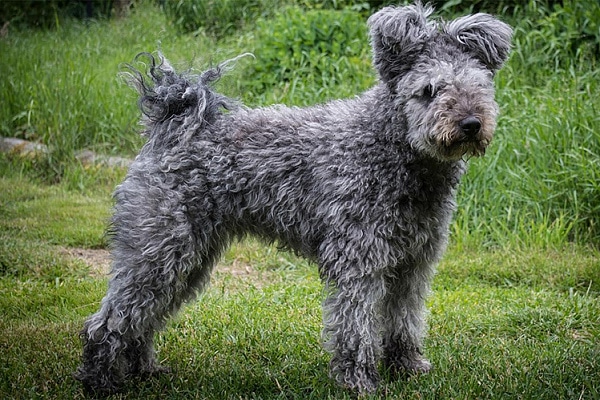Pumi
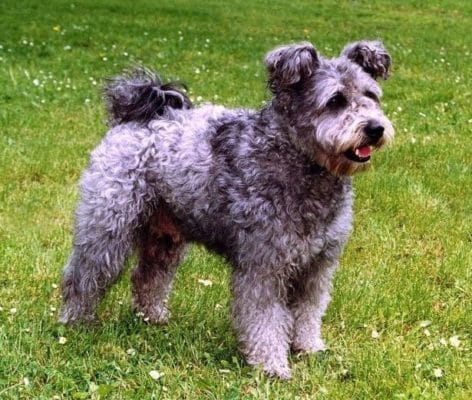
The Pumi makes a great pet that will entertain owners with its cheeky antics and cheerfulness. Provide the Pumi with opportunities for physical activity and mental development. Failure to do so can lead to frustration and a less attractive, unhealthy side to the Pumi’s character.
Table of Contents
Breed Information
| Another Name | Hungarian Pumi, Hungarian herding terrier |
| Origin | Hungary |
| Height | Males 41-47 cm Females 38-44 cm |
| Weight | Males 10-15 kg Females 8-13 kg |
| Fur | Wavy, curly |
| Color | Gray in various shades, black, pale, white |
| Lifespan | 12-13 years |
| FCI Classification | Sheepdogs and Cattledogs (except Swiss Cattledogs) |
| Group | Dogs for children, guard dogs |
| Price | From $200 |
Breed Photos
Origin History
The origin of the Pumi is associated with Hungary. It is believed to have been an accidental breed, formed by mixing Hungarian Puli with other German and French shepherd dogs when they grazed cattle. For a long time, this breed was misidentified as a Puli. It was not until the 1920s that Dr. Emil Rajcis, a professor at the Hungarian University, separated the Pumi from the Puli. The scientist encouraged their breeding to define the traits of the new breed further.
Traditionally, this breed was used for herding and was developed to bring out its best characteristics. It has led to a species of dogs that are considered fast, agile, and capable of making decisions. It makes them excellent at herding cattle. They are still used in Hungary for herding, but their popularity is growing as companion dogs outside of that country.
Appearance
The Pumi is a medium-sized breed known for its quirky facial expression. The dog looks like a teddy bear. The Pumi has a medium-long, wavy and curly coat with various colors and shades, including gray, black, white (this color is quite rare), and shades of pale. Their muzzle is elongated, and their ears are high on the head and are a distinctive feature of this breed. The tail of the Pumi is of medium length, and the dog is small in stature, from 38 to 47 cm depending on the sex. Pumi weighs from 8 to 15 kilograms.
Character
The Pumi makes a great pet that will entertain owners with its cheeky antics and cheerfulness. Provide the Pumi with opportunities for physical activity and mental development. Failure to do so can lead to frustration and a less attractive, unhealthy side to the Pumi’s character.
They are affectionate with all family members and get along well with children. Pumi quickly forms a strong bond, wanting to be part of any family activity. However, they tend to single out one family member as the “leader,” which can be problematic when training them.
The Pumi is indeed a vigilant dog that is always ready for action. Because of their finely tuned protective instincts, they react quickly to even the slightest sound. It makes them excellent watchdogs, as they willingly bark and are very protective of their family and home.
Don’t be surprised if you find a Pumi high up in a tree somewhere, as this breed loves to climb and is considered a nosy neighbor. They also like to hide under things, so always check to see if the pet is hiding under pillows before sitting down. You will never get bored with this breed.
Care
The care of a Pumi is standard. Particular attention is required to the thick coat: it is recommended to brush it regularly. An energetic dog needs active daily walks. Pumi will be uncomfortable in a cramped room: he needs space to play.
Training
Pumi loves to learn and quickly grasps both simple and more complicated commands. It makes them capable of learning and very obedient. Pumi is known for its excellent work ethic and readily handle any challenge. Don’t be afraid to reach for the stars in terms of training. This smart little dog is undoubtedly one of the best in his class.
However, because the breed tends to be aloof and withdrawn, they must be socialized from a young age. They must be introduced to as many new people as possible at an early stage. Otherwise, they may be wary of strangers, guests in your home, and new situations.
Common Diseases
The Pumi has a lifespan of about 12-13 years and is a reasonably healthy and hardy breed. However, they may be prone to specific health problems, including:
- knee pain;
- hip dysplasia;
- degenerative myelopathy.
Nutrition
The food of a Pumi should be balanced, including natural foods: meat, cereals, vegetables, and, if the dog wishes, fruit. Natural food in the form of porridge is healthy and beloved by dogs. It is acceptable to feed ready-made dog food. Then it is better to choose premium food for medium-sized dogs. Cheap eats are not good for your dog – they can cause poisoning.
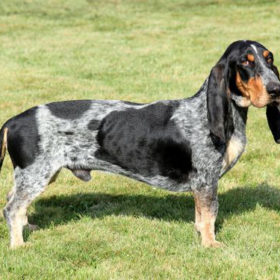 Basset Bleu de Gascogne
Basset Bleu de Gascogne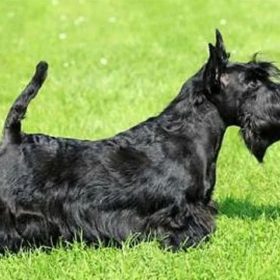 Scottish Terrier
Scottish Terrier Cardigan Welsh Corgi
Cardigan Welsh Corgi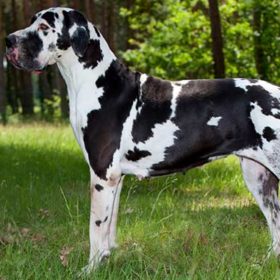 Great Dane
Great Dane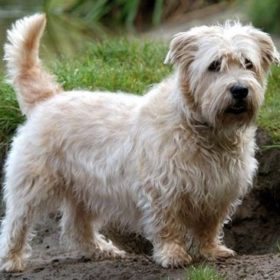 Glen of Imaal Terrier
Glen of Imaal Terrier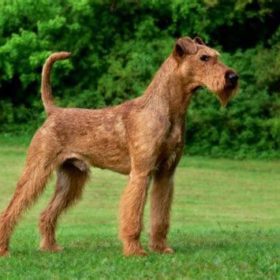 Irish Terrier
Irish Terrier